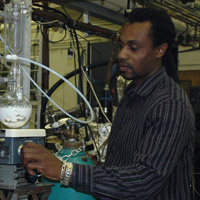|
 Chris Boxe investigates the interaction of traces gases with ice particles, such as cirrus clouds and aircraft contrails in the atmosphere. Image credit: NASA/JPL
Chris Boxe investigates the interaction of traces gases with ice particles, such as cirrus clouds and aircraft contrails in the atmosphere. Image credit: NASA/JPL
 Larger image Larger image
|
|
Related Links:

Tools:
 Join e-mail list Join e-mail list
|
February 14, 2007
Christopher Boxe isn't yet 30 years old, but he's already become an expert in the field of environmental science. He's a scientist and engineer, with two master's degrees -- one in planetary science, the other in environmental science -- and a Ph. D in environmental science and engineering from the California Institute of Technology.
As a child Boxe lived in Kingston, Jamaica. He and his family moved to the United States when he was 6 years old to escape poverty, and allow him and his older brother to attend better schools. Boxe was interested in space and decided to study geological and planetary sciences at Morehouse College in Atlanta. Morehouse is the nation's only historically black, private liberal arts college for men. There he met a man who would change his life: Dr. James King, Jr. who worked at JPL for almost 35 years as a senior chemist and assistant laboratory director for technical divisions. King taught Boxe chemistry and encouraged him to pursue his post-grad and doctoral studies at Caltech. "Dr. King and my advisers at Caltech were patient and gave me opportunities to prove my intellectual potential," Boxe said. "Dr. King really helped shaped my career."
During his current post-doctoral fellowship at JPL, Boxe conducts laboratory and computer simulations of surface chemistry on Earth to determine how it relates to environmental occurrences such as climate change. "My personal opinion is that global warming is occurring," he says. "The real question to answer is to what extent it is caused by human-induced activity as opposed to natural causes."
Trying to figure out the answer, Boxe and his colleague Alfonso Saiz-Lopez created a complex computer system, known as a condense phase-to-air transfer model, that studies Antarctic sea-ice and its interaction with gases over coastal Antarctica.
King also inspired Boxe's desire to work in academia. One of his goals is to teach environmental chemistry at Georgia Institute of Technology in Atlanta. "I really want to inspire minority students to attain a higher education, especially students at Morehouse and other schools in the Atlanta University Center Consortium,which includes Spelman College and Clark Atlanta University," he said. "Interacting with students is my passion, and it's what really drives me. For me, there's no better way to constantly learn than studying."
|